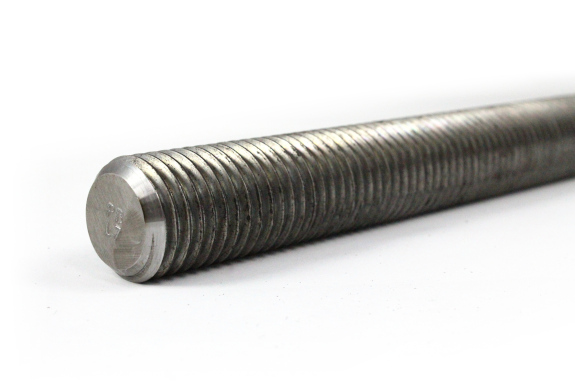 In almost all cases, commercially available all thread rod will not meet F1554 grade 36. First, it is rare that distributors or manufacturers keep lot control on all thread rod. In other words, different heats of all thread rod are commingled so that it is difficult to determine the exact certification document that corresponds to any particular rod. Second, there is usually no traceability associated with stock all thread rod to begin with. It is frequently bought and sold without certification. Third, if mill test reports do accompany the all thread rod, they usually lack a Reduction of Area value which is necessary to determine whether the threaded rod will meet F1554 grade 36. When tested in a finished condition, it is rare that the Reduction of Area value will fall within the guidelines of the specification. Additionally, the Elongation requirement will rarely be met and often the Maximum Tensile Strength requirement will be exceeded.
In almost all cases, commercially available all thread rod will not meet F1554 grade 36. First, it is rare that distributors or manufacturers keep lot control on all thread rod. In other words, different heats of all thread rod are commingled so that it is difficult to determine the exact certification document that corresponds to any particular rod. Second, there is usually no traceability associated with stock all thread rod to begin with. It is frequently bought and sold without certification. Third, if mill test reports do accompany the all thread rod, they usually lack a Reduction of Area value which is necessary to determine whether the threaded rod will meet F1554 grade 36. When tested in a finished condition, it is rare that the Reduction of Area value will fall within the guidelines of the specification. Additionally, the Elongation requirement will rarely be met and often the Maximum Tensile Strength requirement will be exceeded.
What causes these issues associated with Reduction of Area? If you receive certification for commercially available all thread rod, typically it is for the A36 raw material (or other mild steel) used to manufacture the finished product. This is often why there is no Reduction of Area value provided since A36 raw material has no Reduction of Area requirement. A36 raw material, if tested, will typically meet the Reduction of Area and all other requirements of the F1554 grade 36 specification. When the all thread rod in its finished form is tested, it rarely will meet the Reduction of Area requirement. Why is this? Typically the A36 raw material is roll threaded and often cold drawn from a larger diameter prior to threading. These processes result in a work hardening of the steel and create a finished product that is higher in strength and is less ductile than the raw material. Consequently, when the fully threaded rod is tested in its finished condition, the Reduction of Area value does not fall within the guidelines of F1554 grade 36. Additionally, the Elongation and Tensile Strength requirements may not be met.
Portland Bolt stocks domestically produced all thread rod in some diameters that meets the requirements of F1554 grade 36. All thread rod can also be manufactured which meets F1554 grade 36. However, it needs to be cut thread from scratch or “off the shelf” all thread rod needs to be annealed in order to soften it so that the Reduction of Area, Elongation, and Tensile Strength requirements are met. Another option when F1554 grade 36 is specified would be to substitute F1554 grade 55 all thread rod. Section 4.1 of the ASTM specification states, “When Grade 36 is specified, a weldable Grade 55 may be furnished at the supplier’s option.” Portland Bolt stocks certain diameters of F1554 grade 55 all thread rod.
We would suggest that these issues be raised with any supplier claiming to provide stock all thread rod which is certifiable to ASTM F1554 grade 36.

do you offer or can you direct me to
1-1/4″-7 x 12-ft. grade 8 plain finish thread rod
1-1/2″-6 x 12-ft. grade 8 plain finish thread rod
what is the spec. on this grade 8 compared to b-7 rod??
Thanks. Mike Thomas
ph# 616-248-4510
@Mike Thomas – We do not inventory grade 8 all thread rod, and I am not sure if anyone does. We could manufacture shorter threaded studs, but could not make full 12′ bars. We have a comparison chart between B7 and grade 8 on our “Strength Requirements by Grade” webpage accessible under the “Technical Information” section. I will have someone in our sales department contact you about your requirements.
Can you send ft/lb torque values for the F1554 Gr 36 please
@Dan Mottesheard – Per AISC, the published torque values do not necessarily apply to F1554 anchor bolts. See the attached link. https://www.portlandbolt.com/technical/faqs/do-torque-charts-for-tensioning-fasteners-apply-to-anchor-bolts/
wE HAVE F1554 BOLTS EMBEDDED AND SKEWD IN A MASONRY WALL …. Can we run the nut up to the end and bang them straight with a sledge hammer?
@Phil – You would have to consult with the project engineer to answer that. In some cases it may be acceptable to rebend the anchor, but we cannot make those kinds of recommendations as there are many variables at play.
@Robert Wash: Unfortunately, we don’t handle any metric fasteners. All the calculations we’ve done are to imperial standards. I’d recommend contacting a company that specializes in metric fasteners for assistance.
Can you send a table torque values metric sizes m14 to m52